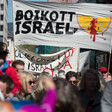Rights and Accountability 31 January 2016
Abu Sakha, who has been a performer and trainer with the Palestinian Circus School since 2007, has yet to be charged with any offense.
According to the Palestinian prisoners’ rights organization Addameer, on 14 December 2015, Abu Sakha was travelling from his home in Jenin, in the north of the occupied West Bank, to work at the school in Birzeit, near Ramallah, when his bus was stopped at the Zaatara military checkpoint near Nablus.
During a check of all passenger IDs by Israeli occupation forces, Abu Sakha was forced from the bus at gunpoint, searched and taken to a nearby military base.
After 11 days in custody, a six-month administrative detention order was issued beginning on 25 December.
Vague accusations
A holdover from British colonial rule, administrative detention is routinely used by Israel against Palestinians, depriving them of their fundamental rights.
According to Addameer, the Israeli military accuses Abu Sakha of being active in an illegal organization and taking part in military activities – but without charging him with a specific crime or affording him any due process to defend himself.
An Israeli military spokesperson told Al Jazeera that Abu Sakha was arrested “due to the danger he posed to the security of the region” based on “confidential information.”
Abu Sakha told an Addameer lawyer who visited him in Megiddo prison in the north of present-day Israel that during his initial interrogations he was accused of general acts without any specific details.
He denied all accusations and refused to sign any papers. Palestinians in detention are frequently pressured to sign documents in Hebrew that they are unable to read.
Abu Sakha had also been arrested at age 17 for allegedly throwing stones at an Israeli military jeep when he was between 12 and 14 years old.
He denied the charges, but was jailed for one month and fined about $1,260.
According to Addameer, Abu Sakha’s case “exemplifies the ways in which the occupation forces use the policy of administrative detention when they fail to obtain proper evidence against Palestinians.”
In addition to violating articles of the Fourth Geneva Convention which states that an accused individual has the right to defend himself against known charges, Israel’s transfer of Abu Sakha to Megiddo prison, outside the occupied West Bank, violates the provision that “persons accused of offenses shall be detained in the occupied country.”
Because Israel requires permits for Palestinians from the West Bank to visit these prisons – but makes those permits difficult to obtain – Abu Sakha’s family has so far been unable to visit him.
“Expression tool”
In his work at the Palestinian Circus School, Abu Sakha specializes in training children with severe disabilities.
One of his colleagues at the school told Al Jazeera that one of his students, who suffers from cerebral palsy, is devastated and risks losing out on his circus classes, an important factor in his mental and physical improvement.
This brief video released by the school features one of his disabled students speaking about Abu Sakha:
Abu Sakha intended to participate in trainings outside the country in March and June of this year.As he told Burn Magazine in 2010: “I don’t speak English very much so I can’t communicate with everybody outside of Palestine. Circus brought me that chance. I can use it as an expression tool to tell our stories.”
In addition to the Amnesty International urgent action alert on Abu Sakha’s behalf, more than 11,700 people have signed an Avaaz petition calling for his release.
When challenged by the right-wing US website Algemeiner as to why Amnesty International was demanding Abu Sakha’s release, the head of Amnesty’s Israeli office, Yonatan Gher, responded that they oppose administrative detention as a human rights violation because of the failure to bring charges or evidence of any criminal offense.
“Detainees such as Abu Sakha are denied the right to defend themselves or effectively challenge the legality of their detention because the authorities largely withhold the ‘evidence’ against them from them and their lawyers,” said Gher.
Algemeiner calls Abu Sakha a “terror supporter” because his Facebook page includes photos calling for the “liberation of Palestine” with “a map that eliminates the Jewish state” and photos of people holding weapons, as well as a tribute to Popular Front for the Liberation of Palestine leader George Habash.
By that standard, anyone posting the Israeli tourism ministry’s maps that declare all of present-day Israel and the occupied West Bank to be “Israel,” or photos of Israeli Prime Ministers Yitzhak Shamir or Menachem Begin – both leaders of pre-state Zionist militias that targeted civilians – are also “terror supporters” deserving of administrative detention.
Amnesty maintains that many Palestinians in Israeli administrative detention are prisoners of conscience, held solely for their right to freedom of expression and association.
It notes that for years Israel has used the practice to hold people who should have never been arrested at all – instead of charging and prosecuting them according to accepted norms of criminal justice. Such detentions can be renewed indefinitely.
Palestinians have frequently waged hunger strikes against their administrative detentions.
Journalist Muhammad al-Qiq remains in prison despite being in critical condition since going on hunger strike that began on 25 November.
Israel currently holds more than 580 Palestinians in administrative detention.




